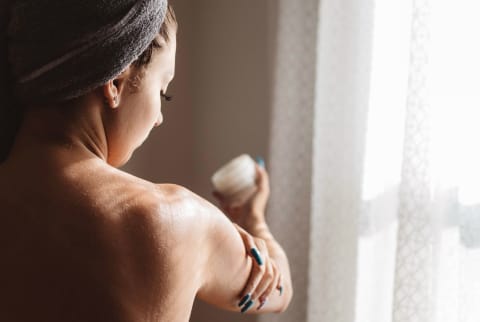Advertisement
The Top 3 Things Derms Want You To Look For In A Body Lotion


Come winter, keeping my skin hydrated can feel like a full-time job. The cold, dry air literally sucks the moisture right out of my epidermis (the actual term for it is transepidermal water loss; it's much more common in arid weather, at night, and for those with a weakened skin barrier.) Not to mention, our bodies have fewer oil glands than our face and can be more susceptible to dry, flaky, ashy skin. That's why I make finding a good body lotion such a high priority for my routine.
And as is true in almost all things regarding beauty, how effective a skin care step will be all comes down to formulation. Finding a well-rounded lotion will keep your skin hydrated all day long by trapping in water (without constant reapplication), soften and smooth the appearance, protect it from environmental stressors, nurture the microbiome, and strengthen the barrier framework. That may sound like a tall order for a product, but don't worry; we broke down exactly what to look for in your daily lotion—complete with tips from derms.
Softening butters, botanical oils & extracts.
We'll start off with the basics: Your lotion needs ingredients that are going to attract water, nurture the skin, and trap in hydration by creating a barrier. A lotion's primary purpose, after all, is to moisturize the skin. But different ingredients help support skin hydration in unique ways—this is why you may want to look for a lotion with a few different botanicals that can create a more robust formula.
Let me elaborate: Some ingredients act as humectants (like aloe vera and hyaluronic acid), which attract and hold water. These are important in lotions as they can help keep the water in the product in your epidermis. But humectants can't do it alone—they often need an assist from emollient and occlusive ingredients too. An emollient is something that softens the skin and makes it feel more comfortable by filling in cracks (there are many ingredients with emollient properties, like oat oil, vitamin E, and shea butter). An occlusive ingredient is one that acts as a shield on top of the skin, trapping in moisture underneath. These are usually thicker, heartier ingredients like coconut oil.
Antioxidants
"People often ask how many antioxidants you should be using regularly; the answer is: the more the better," says board-certified dermatologist Rachel Nazarian, M.D., of Schweiger Dermatology Group. "The more you can help neutralize unstable molecules caused by free radical formation, the longer you can salvage the health of your cells and skin. There's really no limit to how much you can protect and repair your body!" We couldn't agree more. While antioxidant protection is common for the face, the body typically gets less rigorous skin care routines. But we implore you not to skip these for below the neck, too.
The good news is that there are many antioxidants to choose from. You can go for the classics—like vitamins A, C, and E—which have been beloved in the skin care community for quite some time. You can opt for "buzzier" ingredients that aren't necessarily new but are gaining name recognition—coenzyme Q10 and niacinamide for example. Or you can opt for botanical extracts, like green tea, watermelon, apple, and more. These all help your body deal with free radicals, calm inflammation, and improve the appearance of the skin.
Barrier and biome-supporting activities.
As we come to better understand the skin barrier and skin microbiome (and, uh, all the ways we might be damaging it), being better about supporting them has become top of mind. "No new skin care product that comes to market can claim to benefit the skin without keeping the microbiome in mind, using ingredients that support a healthy microbiome and avoiding ingredients that disrupt or damage the microbiome," says board-certified dermatologist Whitney Bowe, M.D.
While the above ingredients will also help your biome and barrier, you should also look for biome-specific ingredients, too. However, not all biotic ingredients are effective (many are not—read more here). That's why we're partial to postbiotics. Postbiotics are the latest, most advanced iteration on biotic skin care. Researchers have been able to identify very important outputs from the bacteria living on our skin1. These are things such as peptides and short-chain fatty acids. The idea here is that rather than replanting the bacterial strains (as in probiotics) or feeding the strains we have naturally (prebiotics), postbiotics do the work and supply skin with these natural byproducts from the start.
